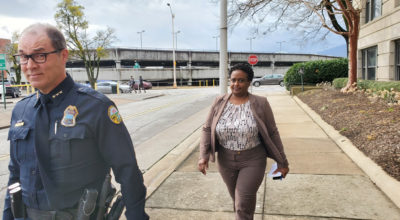
CHATTANOOGA, Tenn., Feb. 23, 2022 — Traffic enforcement is widely hated as arbitrary and capricious, allowing cops to harass minorities and find pretexts for citations and jailings among immigrants and the poor, many of whom use cars without driver licenses or the supposedly required proofs of insurance.
Now there exists in Southeast Tennessee a remedy that puts police and sheriff’s departments on notice about the limited scope of that state’s transportation law. A reform I launched in Chattanooga in February 2018 seeks to halt transportation enforcement against people who are not involved in transportation.
2nd of 3 parts
The solution to routine police enforcement of transportation law against people not involved in transportation is administrative notice, a remedy that relies on oaths of office and good faith of public officials. It puts them in fear of litigation if it can be shown they acted intentionally and knowingly outside their authority.
My reform to ease the pain of the judicial-industrial complex upon minorities, the poor, immigrants and everybody else is a self-help remedy that I expect will work quietly within police departments and finally be ratified by mayors and, eventually, the governor.
The notice bully
The notice typifies the concept of small-scale local solutions, using many tiny, unrecorded steps and decisions, to bring eventual change that is unlikely to come from a top-down fix by important people or a vote in a state legislature. My goal is to apply unbearable pressure on individual officers, applied singly by citizens who are asserting their rights on the side of the road “under the notice,” and who force the oath-taking cop to yield to the claims of the actual law, and exercise his discretion properly.
The concept of “actual law as written” is significant as an idea. In my state, as probably also in yours, there exists a contradiction between the law and constitutional rights on one side and policy/custom on the other.
In law, the doctrine of notice holds that a party notified of fact or law must give account for what is stated in the notice. He must rebut the notice or deny the notice or respond to the notice. But the party cannot ignore the notice. Notice requires accounting for what is reported therein. Ignore a notice of deficiency from the IRS and see how far you get.
My notice makes clear that Tennessee’s transportation law at Title 55 is a foot wide — 12 inches. But practice in every city, burg and county pretends its authority is a yard wide, and that its scope includes EVERY user of the road.
Triple vision isn’t true. The law covers only vehicles for hire.
Though my notice itself doesn’t assert any explicit argument, it makes clear that traffic stops must be reformed to comply with law at the expense of judicial and lawyer law policy. Either the city must alter protocols or rebut the notice. At this writing the city has ignored the notice. Every day the city ignores the notice is stronger proof that it accepts its rehearsal of the facts of the law by acquiescence, that it is “sitting on its rights” and makes no defense against its claims.
Administrative notice creates a new cause of legal action against officials who pretend the actual law doesn’t exist.
Notice is available as proof in civil cases that the arresting cop and his employer were acting only under color of law, and doing so in bad faith.
It also provides a defense in traffic court against criminal charges, whether DUI, speeding, no license, revoked license and the like. Notice allows the accused to challenge police authority and the court’s subject matter jurisdiction, a claim that can be brought up at any time in a criminal proceeding.
From ‘good faith’ to its opposite
Administrative notice’s most crucial power is to deny the normal good-faith defense of state actors.
An officer who arrests someone for “driving without a license” or “driving on a revoked license” or traveling with the bad taillight can be sued for oppression and harassment under state and federal law. I deprive the police officer of his common defense.
That defense has been “I didn’t know” and “I didn’t intend” to oppress this private noncriminal person.
His ordinary rebuttal is that he followed policy in the traffic stop, he obeyed his training while in uniform and that he acted in good faith or under innocent mistake.
Under notice, the citizen can say that the officer acted in bad faith because he knew that some parties are not subject to Title 55 and that his victim told him that he is not subject as a private user, that the traveler was “under the notice” and that there is no evidence whatsoever of commercial activity in that car at the time of the stop.
The presence of a tag on the back of the car is hardly conclusive. The tag makes the car commerce ready, and is not conclusive at all of the auto’s actual commercial use.
The city employee will be held liable for abuse because even though he may not have had personal knowledge of the notice. The officer will be seen to have either actual knowledge of the law and its limits — or imputed knowledge. His employer had notice and what is notice to the town is notice to the individual oath-swearing cop.
Both are liable for abusing the statute and involving themselves in “ultra vires” enforcement. Ultra vires means outside the scope of a corporation’s authority, or outside the authority, and is the key concept in pushing transportation reform administratively rather than politically or judicially.
National model for nonpartisan fix
I have proposed that Chattanooga Mayor Andy Berke, a Democrat, could make himself a national figure by adding of a single question to traffic stop protocol. The reform implied in transportation administrative notice would make Chattanooga a 143 square mile haven from police abuse and benefit 179,000 residents and hundreds of thousands of people who visit the city.
It would be a state first. It would be a national first.
He would be hailed on all sides as a lover of the constitution and be able to draw political support from a broad spectrum of the voting population.
Among progressives, he would be promoted as a friend of the poor. A friend of the oppressed black man. An ally of sanctuary cities and immigrants from Guatemala and Mexico who work in the booming building sector in the city and often travel license free. He would be hailed as a pal of the working man who cannot afford car insurance under the commercial statute and is not bound by it as a private traveler. He would be a booster of all the traditional Democratic client groups, the underclasses least able to make the bondsman’s fee and suffer the bitter fruit of police intervention.
Support among conservatives would be thinner. But many on the right would understand Mayor Berke to be siding with constitutional liberty, free markets, respect for law. He would be supporting God-given, constitutionally guaranteed immunities, the people’s unalienable and inherent right of free travel, free movement and free communication. The right would be happy to see tax savings with police budget cuts.
Mr. Berke would create strong appeal to libertarians and classical liberals such as those who supported Rep. Ron Paul.
The liberating question
My traffic stop fix would bring 80 percent or 90 percent of traffic stops to a quick end. It is a simple question:
Sir [or ma’am], are you involved in the for-profit use of this car today? Are you for-hire or are you engaged in commercial activity, sir [or ma’am]?
If the person behind the wheel says, “What are you talking about? Can’t you see — just taking my children to a soccer game,” that person must be let go because the officer has no jurisdiction under the state’s shipping and freight law upon motor vehicles. The officer will simply say, “Ma’am, I noticed you were 15 miles over the speed limit and for your own safety and the safety of others I urge you, I plead with you, to respect these advisory speed signs for your own safety and welfare. Have a good day, ma’am, and City of Chattanooga wishes you many safe travels.”
If the person says, “Yes, sir. I have a three boxes of medical equipment I’m taking to the ER at Vanderbilt — it’s under contract,” the officer knows he probably has arrest and citation authority under Tennessee’s Title 55.
“Sir, may I see your driver’s license, your proof of insurance and your vehicle registration?”
Not harassment, just commerce and the proper regulation thereon. A green light for the exercise of his authority.
Decentralized people-power solution
Chattanooga, like many cities, has a transportation department. It correctly claims authority over vehicles for hire, I told city attorney Phil Noblett at a meeting, but not over people like him in travels to his office or his travels to church or lunch. How is state law any different in its scope? My work has two parts. One is approaching bureaucrats like Mr. Noblett and elected officials and getting them to see that they are liable for performance.
But needling officials will have limited success. I expect slower but surer results from people themselves in Chattanooga who learn about the notice and understand they can take advantage of it. My notice can be used as a form of legal protection against false arrest and unlawful detention. People who have no choice but to “drive on revoked” will be the first to test the merits of my claims. The notice is intended to be a cause of action against cops and cities, useable by people who know nothing about law or even really how to defend their rights.
My hope is that my filing will take a life of its own among common people who hear about it. If they use my notice in traffic stops, their assertion of their rights will slowly make an impression on a city’s administration. If enough people say, “I am traveling under administrative notice and make no statement without my lawyer present,” the word will get through to every cop. Lawsuits will push Title 55 enforcement to focus more and more on vehicles for hire and obvious shippers.
If my notice starts having an effect in one city, people in other towns in my state will copy it, file it locally and give notice to their city governments. More and more cities will mark their own course. Openness will spread. Eventually, I hope, the whole lump will be leavened.
David Tulis runs NoogaRadio 96.9 FM and is editor of TNtrafficticket.us, covering local economy in Chattanooga and beyond. He is not an attorney and does not give legal advice; for that, consult an attorney licensed to practice in your state or on another planet, where the law may indeed matter. He hosts a marketplace show two hours weekdays 2 p.m. live at NoogaRadio.com and also live on Facebook at NoogaRadio. He is married and the father of four homeschooled children.
Tennessee Transportation Administrative Notice as PDF
This 20-page legal notice lets you fight back vs. illicit ‘traffic stops’ — sue for damages, have defense in your criminal case
Donate to help David Tulis in court case for liberty

